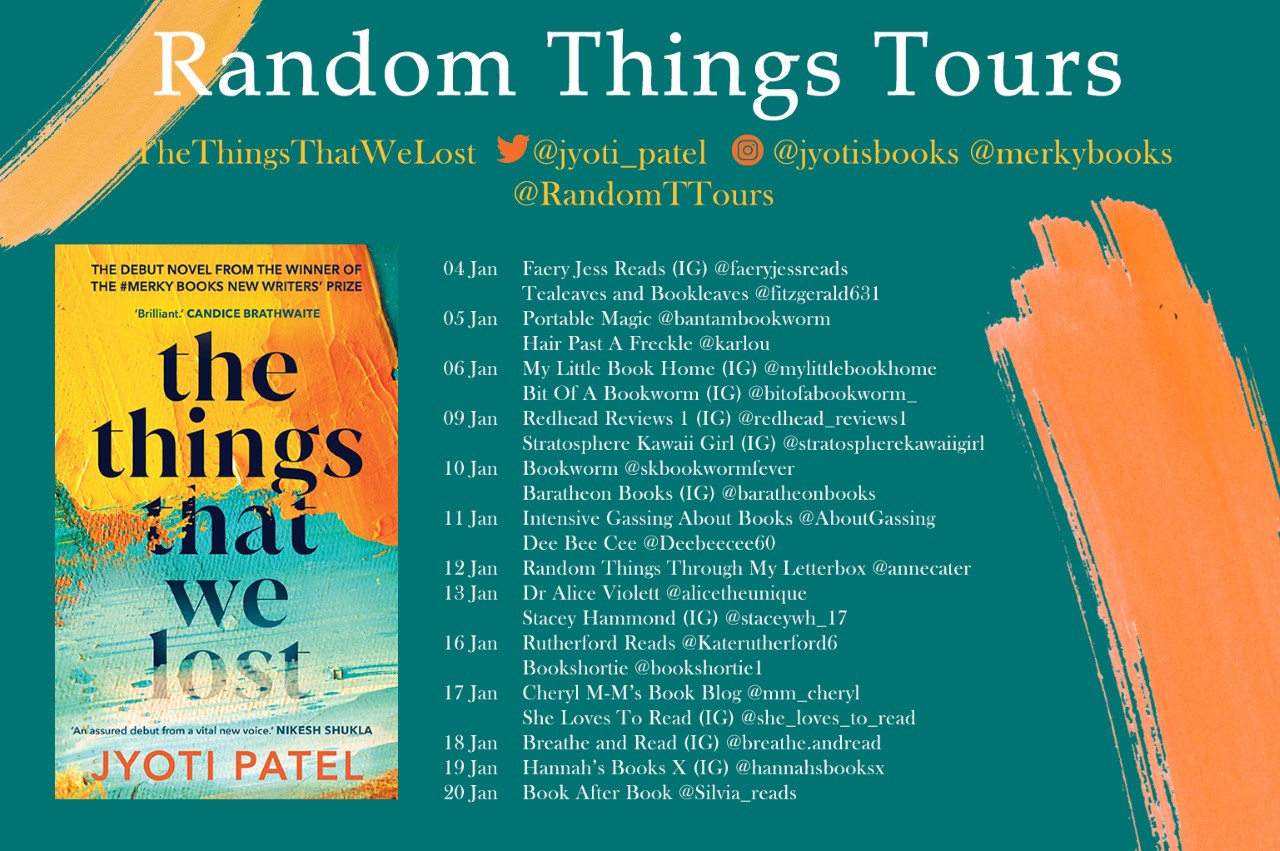*** WINNER OF THE 2021 #MERKY BOOKS NEW WRITERS' PRIZE***
Nik has lots of questions about his late father but knows better than to ask his mother, Avani. It's their unspoken rule.
When his grandfather dies, Nik has the opportunity to learn about the man he never met. Armed with a key and new knowledge about his parents' past, Nik sets out to unlock the secrets that his mother has been holding onto his whole life.
As the carefully crafted portrait Avani has painted for her son begins to crack, and painful truths emerge, can the two of them find their way back to each other?
The Things That We Lost is a beautifully tender exploration of family, loss and the lengths to which we go to protect the ones we love.
The Things That We Lost by Jyoti Patel is published in hardback on 12 January 2023 by Merky Books and is the winner of the 2021 Merky Books New Writers Prize.
As part of this #RandomThingsTours Blog Tour I am delighted to share an extract from the book with you here today.
was the truth, so she said it anyway. She packed away her books and stood to leave, trying her best to shrug away her new companion, but the girl followed, talking about how she’d spent a wholly transformative month in an ashram beside the Ganges River. It sounded so unfamiliar to Avani. She wanted to correct her. The River Ganga, she wanted to say. To me, it ’s the River Ganga. And to her parents, the river was Gangaji, a goddess. Avani’s rendition was a mix of the names, an attempt to blend them together. The girl had still been yammering on when Avani simply turned and walked the other way, splitting their path in two.
She pulled a blue-ink fountain pen from her coat pocket and added a vein to the sketch, hoping that she was get- ting the shape of the river right, these waters that flowed thousands of miles away. She felt like a fraud, being eighteen and having never visited the place that so much of her identity was attributed to. One day, she hoped, she’d be able to greet India in its entirety, away from the romanticised version of it she so often met in Western art, away too from the sentimentality of the Bollywood films her mother cried into her chundri over. Avani’s brother, Chand, had visited for the first time the previous summer. He’d come back with a pair of silver jhaanjhar for Avani, which she’d worn every day since. For a few weeks after his return, he’d been bursting with stories of near-lethal rickshaw rides in Delhi, mornings devouring idli and dosa with coconut chutney in Bangalore, the taste of juicy sitafar and papayu in Baroda. The photos he’d taken were alive with the spirit of the place; women sell- ing garlands of marigolds outside temples, giant banyantrees holding centuries of secrets within their aerial roots, green bananas stacked high on brightly coloured carts, luscious pink bougainvillea curled around doorways as though bestowing good fortune. Avani’s favourite had been the photo he’d taken from the window of a Tata- mobile in Jaipur, capturing a man lying horizontal on a parked scooter, his feet hanging off the back of it, his arms wrapped around the handlebars as he caught a quick kip, seemingly undisturbed by rush hour zooming past him. When Avani asked her brother why the majority of the photos he’d taken were of the streets, he’d told her: People think the best part of India is found in the temples and the food and the valleys, but so much of India unfolds in the journey. When you travel from one state to the next. In the ‘in between’.
Jyoti Patel was born in Paris to British Indian parents and grew up in North West London.
She is a graduate of the University of East Anglia’s Prose Fiction MA and winner of the 2021 #Merky Books New Writers’ Prize.
Her writing has previously been published as part of We Present's ‘Literally’ series and in the anthology for the 2022 Bristol Short Story Prize, for which she was shortlisted. The Things That We Lost is her debut novel.
Twitter @Jyoti_Patel
#Merky Books
This year we’re excited to launch the third #Merky Books New Writers’ Prize, an annual writing competition that is open to young, underrepresented, and unpublished writers from across the UK and ROI. The winner of the New Writers’ Prize will receive a publishing contract with #Merky Books. The prize will also aim to provide all applicants with the tools, information and access they need to develop their ideas, progress their writing and set off on the path to publication.
Twitter @MerkyBooks


.png)

.png)


.jpeg)
.jpg)
No comments:
Post a Comment